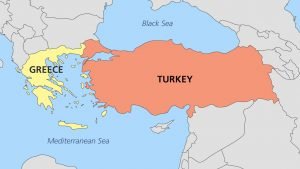The Changing Landscape of Greek-Turkish Relations
A Resurgence of Warmth
In the late 1990s, relations between Greece and Turkey experienced a remarkable change. For generations, tensions had marred interactions between the neighboring countries with a history of conflict over territorial disputes in the Aegean Sea region. However, a series of earthquakes striking both nations helped spur more positive diplomatic relations. When disaster struck each country, the other was quick to provide vital assistance and relief aid. Images of Greek and Turkish rescue workers cooperating to save earthquake victims fostered goodwill and closer cooperation between the peoples and governments. This new atmosphere of partnership and understanding continued developing in other areas. Military ceremonies honorin fallen soldiers took on a more conciliatory tone. Business and community leaders organized exchanges to promote economic and cultural ties. Even the media in each country began publishing commentaries advocating for friendship rather than nationalist hostilities. Political leaders like Greek Foreign Minister George Papandreou and his Turkish counterpart Ismail Cem worked to sustain this momentum for change through regular phone calls and commitment to resolving longstanding problems.

Remaining Challenges
However, significant obstacles remained. Both Turkey and Greece had ramped up expensive military procurements, unsettling the other side. Turkey occasionally made ambiguous threats referencing Greek islands in the Aegean. Most importantly, the divided island of Cyprus was still partitioned along ethnic lines following Turkey’s 1974 invasion of northern Cyprus. Domestic political realities also posed difficulties. Papandreou needed to avoid appearing weak on issues of national sovereignty to opponents ahead of Greece’s 2000 election. In Turkey, the powerful military establishment traditionally opposed concessions and civilian government had limited autonomy in reforms. Regional issues further complicated bilateral ties. Tensions between Israel and Palestinians historically influenced Greek-Turkish dynamics given their opposing stances. The 1999 Kosovo crisis also required close coordination between the countries’ foreign ministries. Maintaining the hard-won rapport would require navigating these complex national and geopolitical factors. Sustaining the Peace Process International partners like the United States strongly supported Greek-Turkish rapprochement. President Clinton planned high-level meetings with both countries’ leaders to encourage cooperation. As the European Union weighed Turkey’s candidacy bid, stake were high for cementing good relations. The so-called “seismic diplomacy” sparked by natural disasters presented a pivotal chance to resolve conflicts poisoning ties for generations. Leaders understood this historic opportunity could not be squandered. Further confidence-building measures were implemented like regular ministerial contact, cultural festivals, and joint military training exercises. Border patrols no longer aggressively confronted each other, easing long-simmering tensions. Non-government groups played a role too, with interfaith and philanthropic initiatives promoting understanding between citizens. Steady diplomatic engagement began yielding results. By late 1999, Greece lifted objections to Turkish EU accession talks. Technical commissions made progress delineating airspace and maritime boundaries. Even nationalist media outlets gradually shifted to prioritizing stability over jingoism. Outside observers saw this transformation as a potential model for other protracted disputes worldwide. Recent Dynamics and the Future In the 21st century, the momentum slowed but Greek-Turkish relations avoided returning to outright hostility. Both countries have joined the EU and NATO, institutionalizing cooperation. However, periodic flare-ups occur like when Turkish fighter jets violated Greek airspace in 2020. Lingering issues from Cyprus to energy rights ensure disagreements will continue. Geopolitics now involve new players too. Russia seeks influence in the region which could strain Greek-Turkish solidarity within Western alliances. Similarly, tensions surrounding Turkey’s policies regarding Syria and the eastern Mediterranean complicate bilateral ties. Yet overall, citizens on both sides now take peace for granted whereas conflict was once seen as inevitable. Going forward, steady leadership committed to open communication and compromise will be crucial to maintain this fragile understanding. Continued economic integration may curb nationalist influences by intertwining societal interests. Resolving long-term disputes fully would cement a new era of good-neighborly partnership, encouraging further cooperation on shared challenges like climate change, public health and counterterrorism. With good faith, the foundations built through “seismic diplomacy” can nurture lasting Greek-Turkish amity. 